AMBER WAVES OF GRAIN
I am sitting in the Las Vegas airport in an airy, glass and steel alcove overlooking the tarmac. The sun is several degrees above the mountain range, and jets rocket down the runway. I watch as their sleek bodies realize their weightlessness, and the landing gear suspension pops out as if surprised at such a sudden, newfound capacity, and then they’re off.
We’ve been in the southwest for a long weekend vacation, and I’ve been trying to play it slow, to soak it all in: the glass wall, the aluminum struts that support it, the cabling design that connects down to the terrazzo floor, the small brass plaque dedicating this sunlit area to someone named Maria. The plaque is hidden down at the bottom of the windows, square with the floor. There’s a little brown bird trapped in here with us. She’s found some popcorn spilled over in a corner.
Perhaps it was the time change, or the constant movement of our itinerary, but this has been the kind of weekend that’s stretched out in time. Breakfast this morning seems like a long time ago, but it was barely two hours ago. Still, the setting seems otherworldly. We ate in a one of the many hotel restaurants in front of a different bank of windows, this time overlooking the pool deck, where men busied themselves with staging the area for another day in Las Vegas.
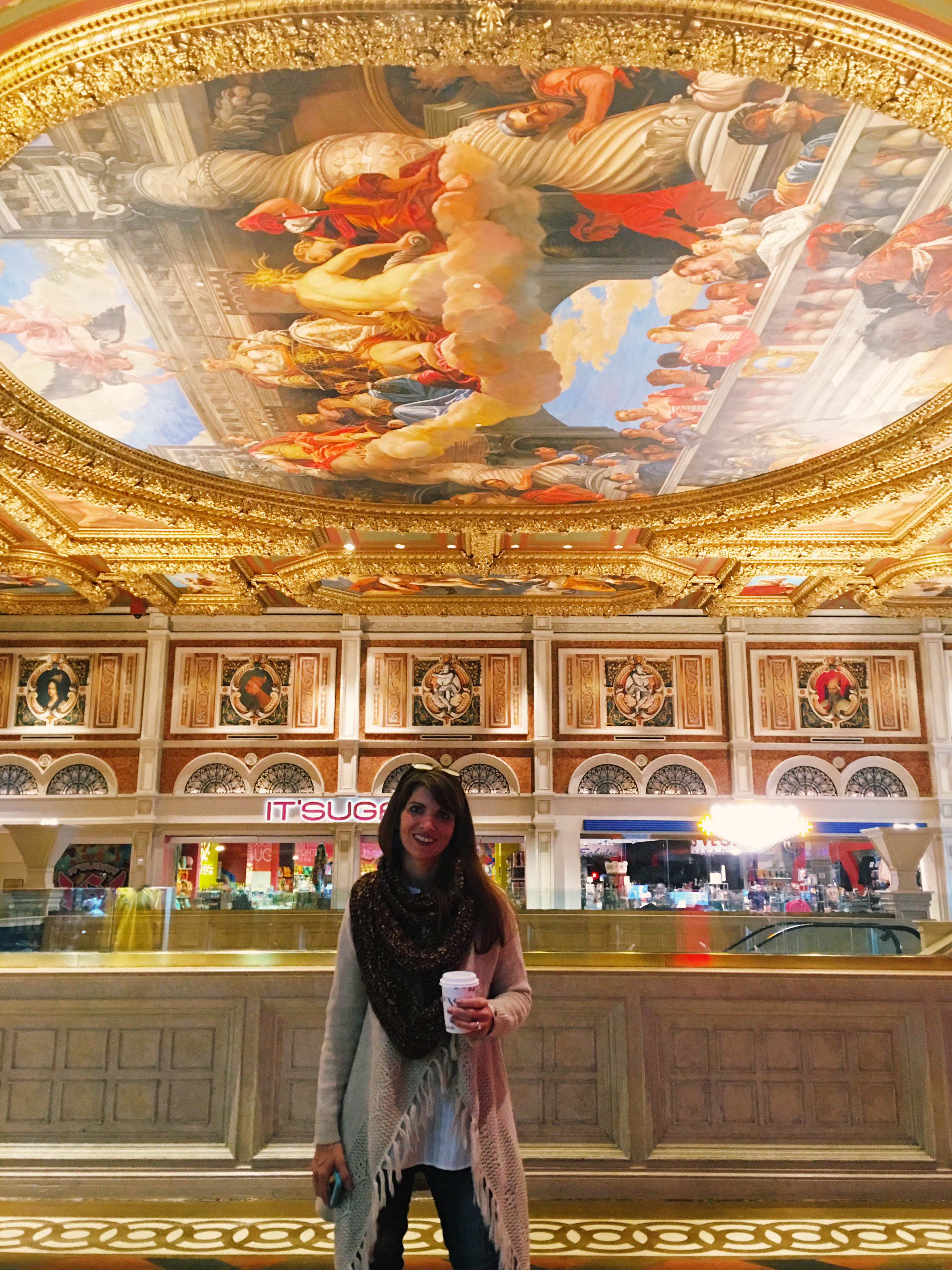
We landed Thursday evening and stayed at The Venetian. Part of me wanted to dislike it here—to see through its Disney-like fakery. What other city is famous for resorts that simply have miniature facsimiles of other parts of the world? But even in the daylight, the Strip overwhelms senses, and even upon closer inspection, so much is real: the tiled mosaics about the garden fountains, the paper-thin wine glasses at supper, the vase full of roses at least three feet tall.
I’d rented a car at the airport and on Friday we drove to Arizona. We were heading for the Grand Canyon but stopped at the Hoover Dam. The scale of the desert plain, the unworn mountain ranges guarding its borders, fixed my attention through the long stretches of highway. Empty, barren nothing gave way to yellow grass plains, scattered with scrub here and there, which then gave way to taller scrub, which then gave way to pine forest. There wasn’t much traffic. We were in a Jaguar sedan, which made easy work of the trip, cruising comfortably in the upper echelons of the speedometer. I looked for blurs of coyote, jack rabbit, elk.
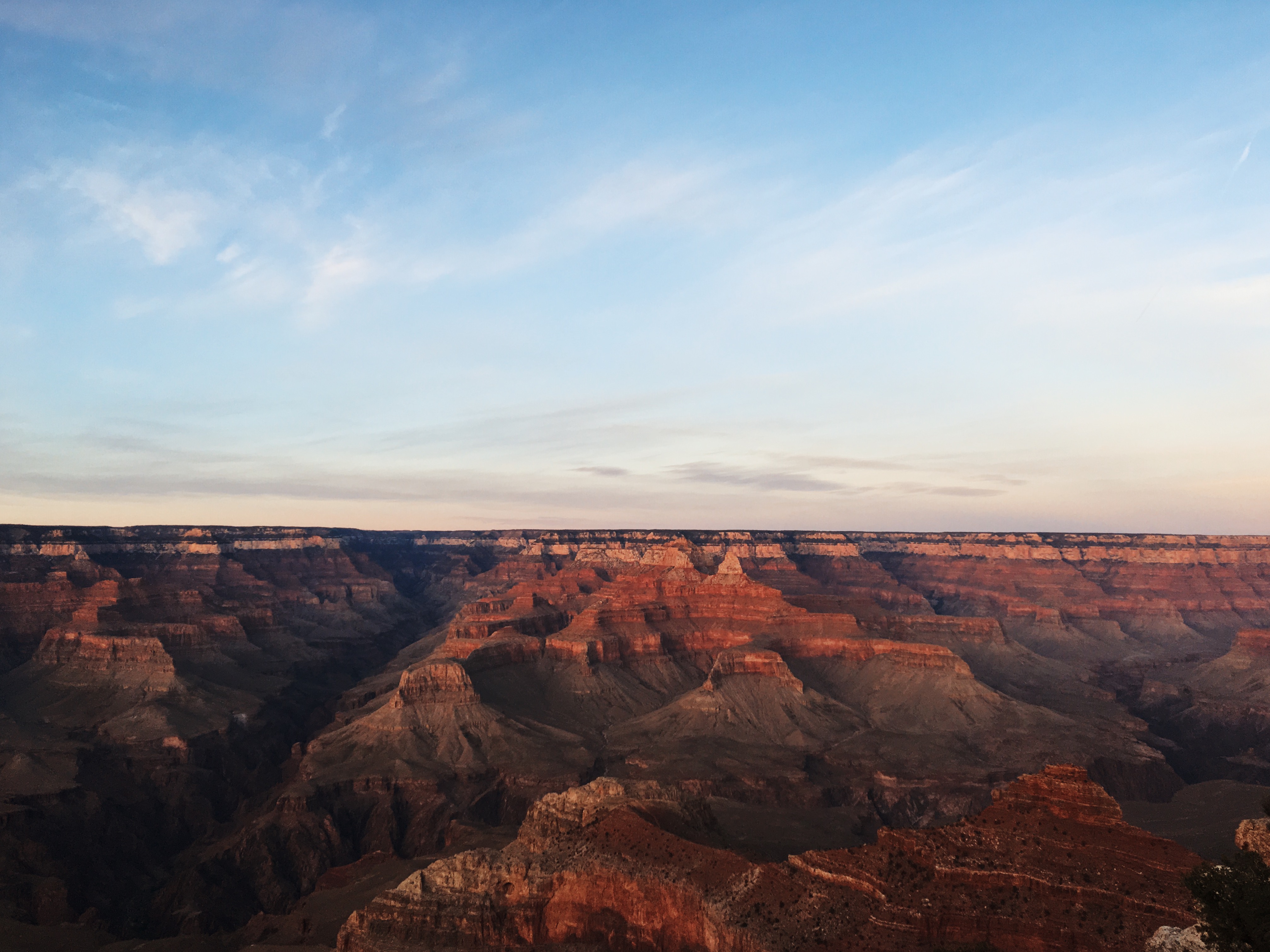
Along the highway north to the Canyon, we watched the sun slink lower and lower. We arrived at the golden hour—the canyon fading into amber haze, the sky afire in pink and blue. For the first time in memory, I am astonished by the scope of all that’s before me. I have seen pictures of the Grand Canyon before, and I took plenty of my own, but they simply didn’t translate.
Soon the light was gone, and we traced the trail back to the car in a cold, windy darkness. We stayed the night at a lodge in the park, taking supper with outdoors-folk and sightseers, many still in their dusty gear. At a general store nearby, we browsed through tourist knickknacks and groceries and essential outdoor outfitting. A woman my age, a hiker, checked out with rice and canned tomatoes and a plastic bottle of whiskey, which she slipped into her pocketbook after the clerk rang it up. In the lonely darkness on the shoulders of the canyon, it made sense.
The next morning, our circadian rhythms still defiantly remaining in the eastern time zone, we awoke with plenty of time to make our way back to the rim for the sunrise. A few dozen people joined us, many wrapped in sleeping bags or blankets or extra layers. German, Hispanic, Japanese, American, all of us waiting as the purple skies lifted into lighter blue and then the light peered over the plateau and set the canyon with dramatic light. There was a shared humanity to it, this solar observation in such a remarkable place. The river carried its course somewhere a mile below us, and it would be a few more hours until the morning sun found it.
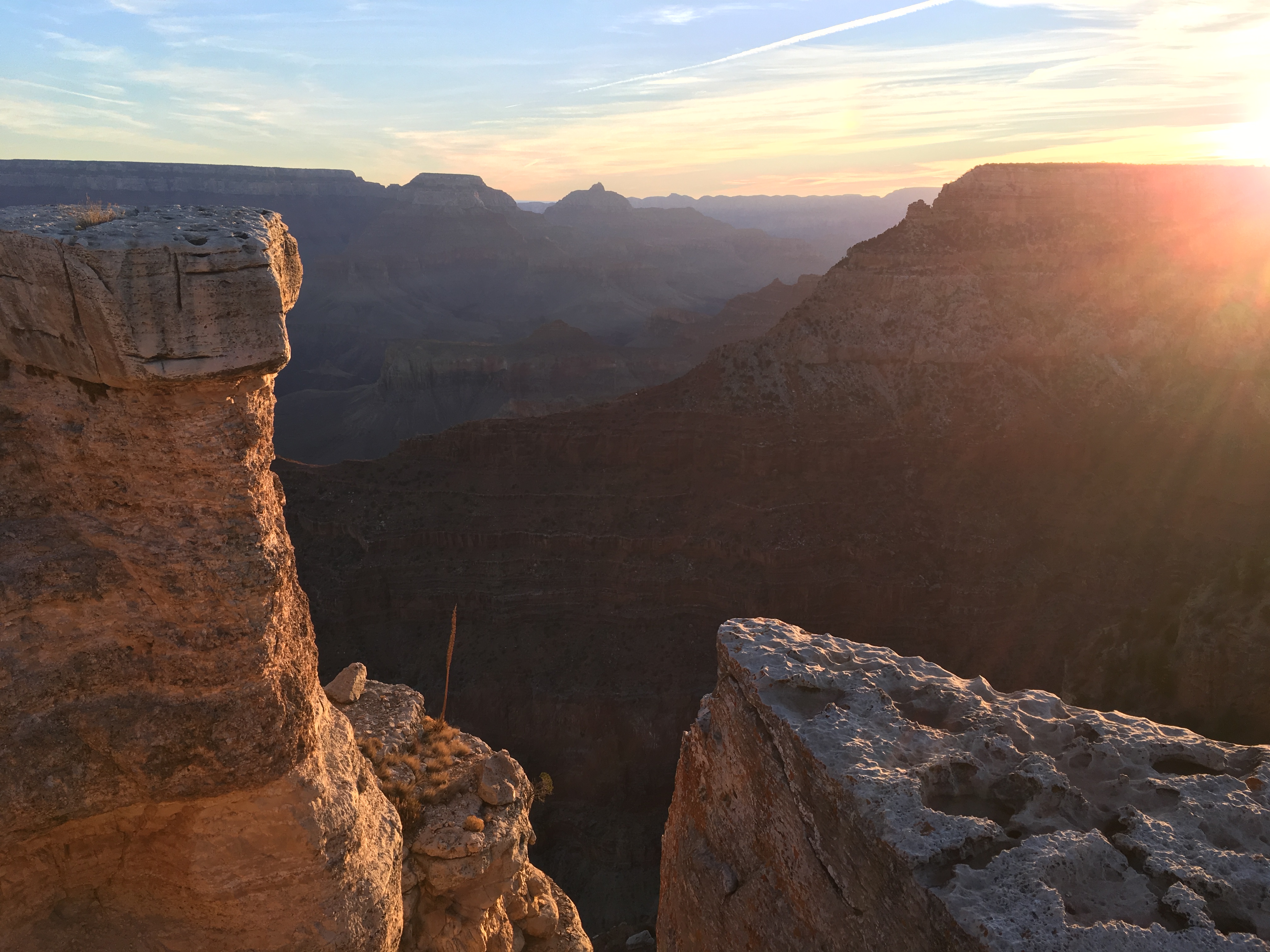
We were driving back to Nevada by then, staring out at the empty ranches that dotted this other-worldly landscape. It felt important to see them—the camping trailers that became permanent homes, some with lean-to add-ons, a satellite dish poking skyward. What a vastly different America this is.
As I drove, Kelly unwound a ball of yarn and crocheted scarves for the kids, a way to occupy time and think of them. She stitched back and forth, the yarn slowly fading from one dye color to the next, the changes hard to notice at first. The finished scarf’s striations of color were like a miniature version of the canyon walls. I think about millennia.
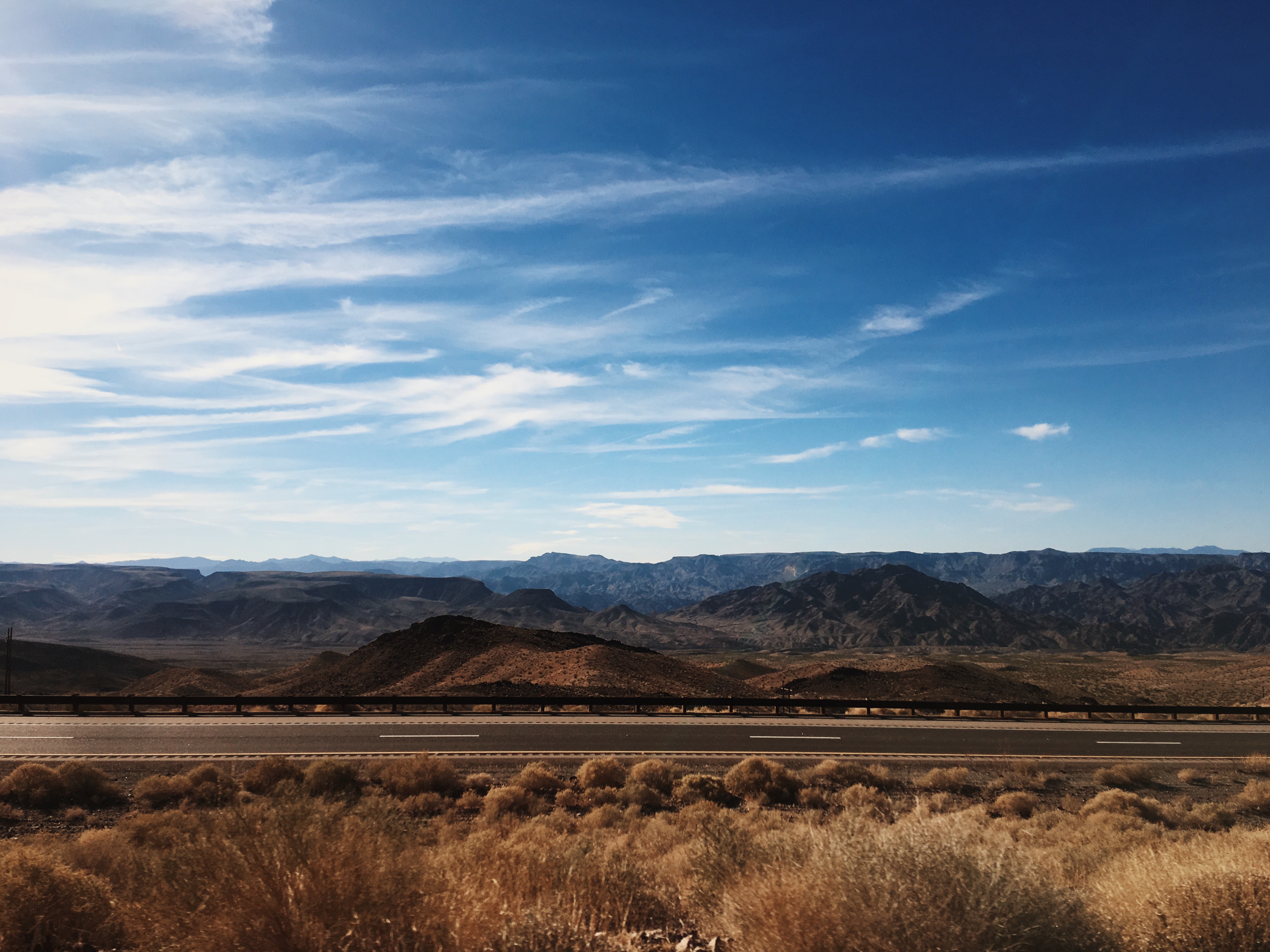
Back in Las Vegas for Saturday evening, this time at the Wynn, and the Strip has gallantly embraced its salacity. By five o’clock, the hordes wander from casino to casino, women wearing only stickers perch near the escalators, drunks wobble through the crosswalks. We stop for a coffee, a caffeine pulse, and gawk at the Bellagio fountains. They are somehow bigger than we thought.
A hot shower, a shave, a collared shirt for supper at an expensive restaurant where there are six-thousand-dollar bottles of wine and two waiters for each table. It would be a sin for the plates to be served out of syncopation.
There is a joy to people watching in Las Vegas, of seeing different variations of “dressed up” among the generations: retirees in their khakis and pantsuits and tennis shoes; bachelorettes in impossibly short dresses and platinum-dyed hair; foreign tourists with fanny-packs, sunglasses, and three-day beards perching at blackjack tables; and then the people in the casinos who were by themselves, the ones I should not paint too broadly but for whom the hours are spent smoking cigarettes and pushing the buttons over and over again as the video machines avidly consume them.
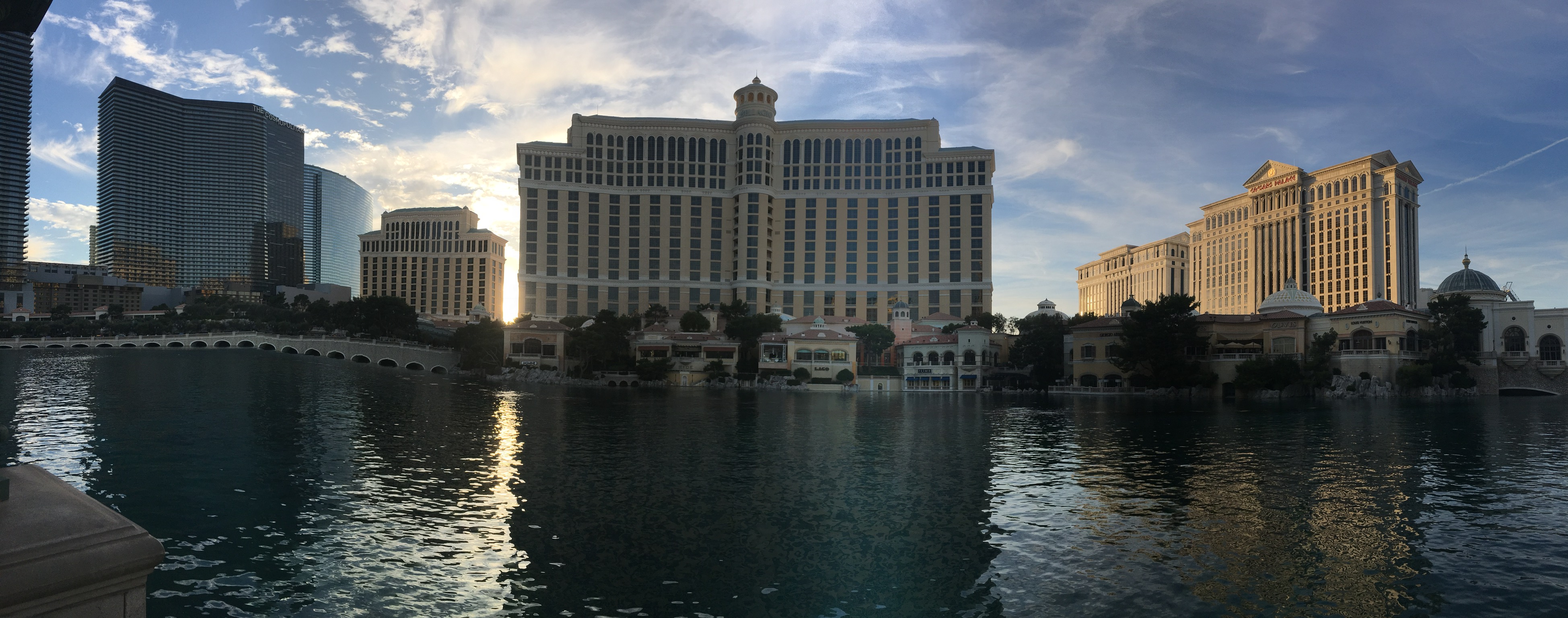
Two (modest) glasses of wine and plates of steak later, and we’re driving across town to see Penn and Teller’s magic show. We are bone tired, our travels catching up to us, and we discover weariness only magnifies the effects of illusion. Penn does a hilarious bit about airport security. Teller, wordlessly, pours coins from his empty palms, scrapes them back up, then transforms them into a school of goldfish, and we are almost too stunned to applaud.
After a short night’s rest, we rolled our suitcases in the early morning light and left. There were still men and women in last night’s clothes drinking and playing cards.
Back at the airport, I notice for the first time there are two attitudes of travelers here, the first being the arrivals, the sober-eyed, tucked-in kind, and the latter being the departing, for whom the early sunlight illuminates a posture best summed up as disheveled.
I watch the brown bird fluttering from one side of this terminal bump-out to the other. It struck me that the bird doesn’t behave as if it’s trapped—it’s not flying into the glass or trying to escape. Rather, it’s simply landing here and there were bits of food were left behind, unaware of the irony visualized in the jets taking flight on the other side of the window.
There is a lesson here, one I’m getting closer to understanding.
We arrive home several hours later to find North Carolina under a dark, wet blanket of fog. Tall, deciduous trees are fascinating again. When we pick up our children, they cling to us and hug and kiss us, and I remember it’s good to know what missing them feels like, that it’s good for them to miss us.
An hour later, and we’re tucking them into bed, and not long after, we’re done for the night, too exhausted to think about the school and work weeks ahead, too eager to close our eyes and drift off, to consider and reconsider the vast stretches of life we’ve just witnessed.

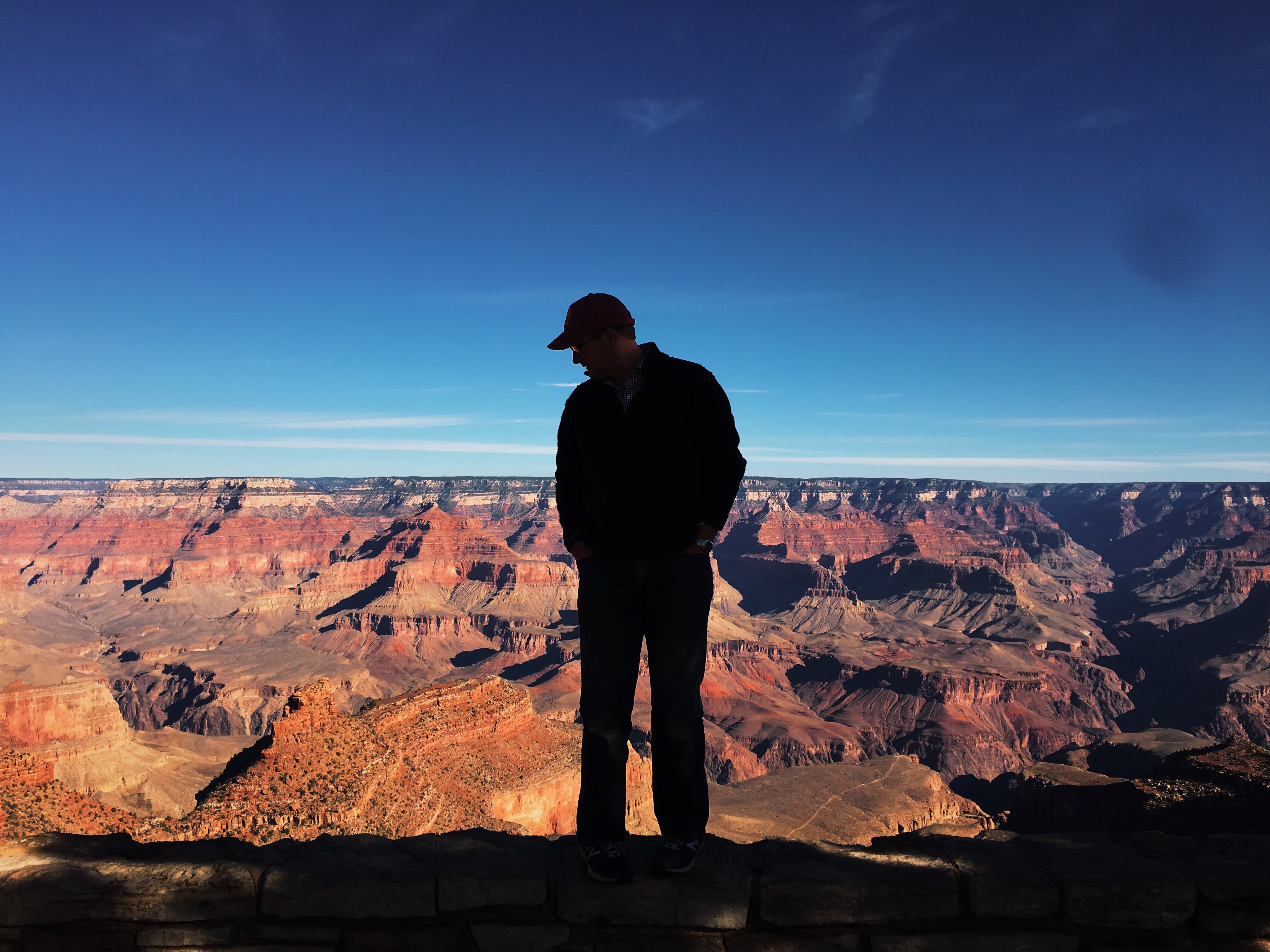




Leave a Reply